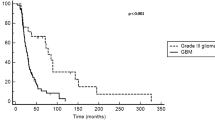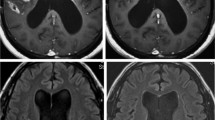Abstract
Purpose
Antiangiogenic treatment approaches have failed to improve outcome in randomized trials of high-grade astrocytoma. One key mechanism of resistance to antiangiogenic treatment may concern the upregulation of alternative pro-angiogenic pathways. Regorafenib is a potent multikinase inhibitor that may alter some of those pathways. In this retrospective study, we investigated efficacy and radiographic tumor growth patterns of regorafenib in recurrent high-grade astrocytoma.
Methods
We screened for patients with high-grade astrocytoma in whom regorafenib was administered for at least 4 weeks. We assessed treatment efficacy in terms of progression-free survival (PFS), overall survival, and adverse events defined by Common Toxicity Criteria (CTC). In addition, radiographic tumor growth patterns were determined at baseline and recurrence.
Results
A total of 6 patients met eligibility criteria. The number of recurrences prior to regorafenib varied between 2 and 6. Patients were on regorafenib treatment for at least 4 weeks and maximally 14 weeks. Median PFS was 3.5 months and ranged from 2.0 to 4.0 months. Radiographic response was progressive disease in all patients with an objective response rate of 0%. CTC°3 adverse events were observed in all but one patient. The most common radiographic growth pattern was local with no change in growth pattern at recurrence. An infiltrative tumor growth was not induced in any patient.
Conclusions
This retrospective study indicates a very poor performance of regorafenib in recurrent high-grade astrocytoma with a fairly high number of CTC°3 adverse events. In addition, regorafenib does not seem to bear a potential for infiltrative tumor growth promotion.


Similar content being viewed by others
References
Chinot OL, Wick W, MasonW et al (2014) Bevacizumab plus radiotherapy-temozolomide for newly diagnosed glioblastoma. N Engl J Med 370(8):709–722
Das S, Marsden PA (2013) Angiogenesis in glioblastoma. N Engl J Med 369(16):1561–1563
Gilbert MR, Dignam JJ, Armstrong TS et al (2014) A randomized trial of bevacizumab for newly diagnosed glioblastoma. N Engl J Med 370(8):699–708
Hundsberger T, Reardon DA, Wen PY (2017) Angiogenesis inhibitors in tackling recurrent glioblastoma. Expert Rev Anticancer Ther 17(6):507–515
Lombardi G, De Salvo GL, Brandes AA et al (2019) Regorafenib compared with lomustine in patients with relapsed glioblastoma (REGOMA): a multicentre, open-label, randomised, controlled, phase 2 trial. Lancet Oncol 20(1):110–119
Louis DN, Perry A, Reifenberger G et al (2016) The 2016 World Health Organization Classification of Tumors of the Central Nervous System: a summary. Acta Neuropathol 131(6):803–820
Norden AD, Young GS, Setayesh K et al (2008) Bevacizumab for recurrent malignant gliomas: efficacy, toxicity, and patterns of recurrence. Neurology 70(10):779–787
Schaub C, Kebir S, Junold N et al (2018) Tumor growth patterns of MGMT-non-methylated glioblastoma in the randomized GLARIUS trial. J Cancer Res Clin Oncol 144(8):1581–1589
Uschner FE, Schueller F, Nikolova I et al (2018) The multikinase inhibitor regorafenib decreases angiogenesis and improves portal hypertension. Oncotarget 9(90):36220–36237
van den Bent MJ, Baumert B, Erridge SC et al (2017) Interim results from the CATNON trial (EORTC study 26053-22054) of treatment with concurrent and adjuvant temozolomide for 1p/19q non-co-deleted anaplastic glioma: a phase 3, randomised, open-label intergroup study. Lancet 390(10103):1645–1653
van den Bent MJ, Klein M, Smits M et al (2018) Bevacizumab and temozolomide in patients with first recurrence of WHO grade II and III glioma, without 1p/19q co-deletion (TAVAREC): a randomised controlled phase 2 EORTC trial. Lancet Oncol 19(9):1170–1179
Weller M, van den Bent M, Tonn JC et al (2017) European Association for Neuro-Oncology (EANO) guideline on the diagnosis and treatment of adult astrocytic and oligodendroglial gliomas. Lancet Oncol 18(6):e315–e329
Wen PY, Macdonald DR, Reardon DA et al (2010) Updated response assessment criteria for high-grade gliomas: response assessment in neuro-oncology working group. J Clin Oncol 28(11):1963–1972
Wick W, Chinot OL, Bendszus M et al (2016) Evaluation of pseudoprogression rates and tumor progression patterns in a phase III trial of bevacizumab plus radiotherapy/temozolomide for newly diagnosed glioblastoma. Neurooncology 18(10):1434–1441
Wick W, Gorlia T, Bendszus M et al (2017) Lomustine and bevacizumab in progressive glioblastoma. N Engl J Med 377(20):1954–1963
Author information
Authors and Affiliations
Corresponding author
Ethics declarations
Conflict of interest
The authors declare that they have no conflict of interest.
Ethics approval and consent to participate
All procedures performed in studies involving human participants were in accordance with the ethical standards of the institutional and/or national research committee and with the 1964 Helsinki declaration and its later amendments or comparable ethical standards. For this retrospective study, formal consent is not required.
Additional information
Publisher’s Note
Springer Nature remains neutral with regard to jurisdictional claims in published maps and institutional affiliations.
Rights and permissions
About this article
Cite this article
Kebir, S., Rauschenbach, L., Radbruch, A. et al. Regorafenib in patients with recurrent high-grade astrocytoma. J Cancer Res Clin Oncol 145, 1037–1042 (2019). https://doi.org/10.1007/s00432-019-02868-5
Received:
Accepted:
Published:
Issue Date:
DOI: https://doi.org/10.1007/s00432-019-02868-5




